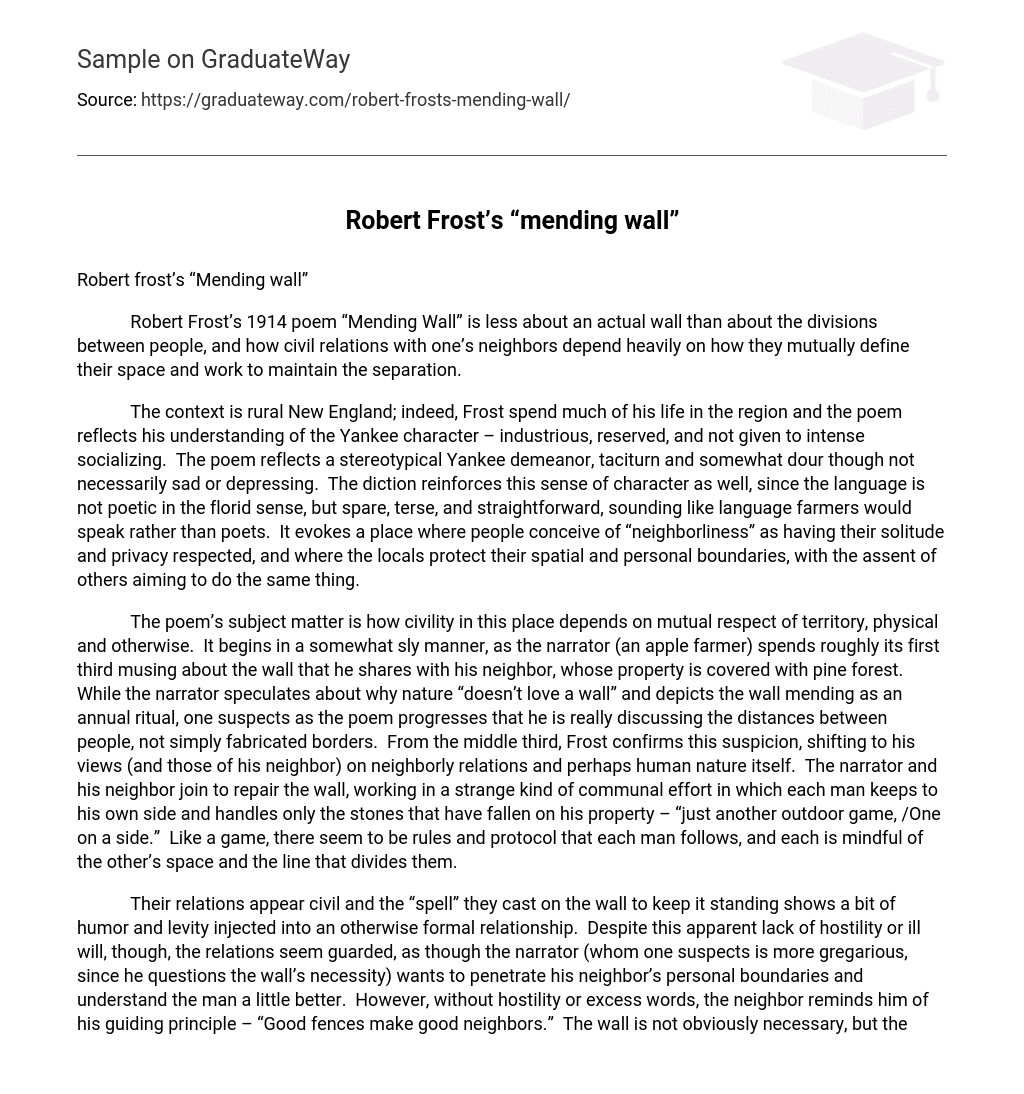Robert Frost’s 1914 poem “Mending Wall” is less about an actual wall than about the divisions between people, and how civil relations with one’s neighbors depend heavily on how they mutually define their space and work to maintain the separation.
The context is rural New England; indeed, Frost spend much of his life in the region and the poem reflects his understanding of the Yankee character – industrious, reserved, and not given to intense socializing. The poem reflects a stereotypical Yankee demeanor, taciturn and somewhat dour though not necessarily sad or depressing. The diction reinforces this sense of character as well, since the language is not poetic in the florid sense, but spare, terse, and straightforward, sounding like language farmers would speak rather than poets. It evokes a place where people conceive of “neighborliness” as having their solitude and privacy respected, and where the locals protect their spatial and personal boundaries, with the assent of others aiming to do the same thing.
The poem’s subject matter is how civility in this place depends on mutual respect of territory, physical and otherwise. It begins in a somewhat sly manner, as the narrator (an apple farmer) spends roughly its first third musing about the wall that he shares with his neighbor, whose property is covered with pine forest. While the narrator speculates about why nature “doesn’t love a wall” and depicts the wall mending as an annual ritual, one suspects as the poem progresses that he is really discussing the distances between people, not simply fabricated borders. From the middle third, Frost confirms this suspicion, shifting to his views (and those of his neighbor) on neighborly relations and perhaps human nature itself. The narrator and his neighbor join to repair the wall, working in a strange kind of communal effort in which each man keeps to his own side and handles only the stones that have fallen on his property – “just another outdoor game, /One on a side.” Like a game, there seem to be rules and protocol that each man follows, and each is mindful of the other’s space and the line that divides them.
Their relations appear civil and the “spell” they cast on the wall to keep it standing shows a bit of humor and levity injected into an otherwise formal relationship. Despite this apparent lack of hostility or ill will, though, the relations seem guarded, as though the narrator (whom one suspects is more gregarious, since he questions the wall’s necessity) wants to penetrate his neighbor’s personal boundaries and understand the man a little better. However, without hostility or excess words, the neighbor reminds him of his guiding principle – “Good fences make good neighbors.” The wall is not obviously necessary, but the neighbor states more than once the poem’s actual theme – “Good fences make good neighbors.” This implies that civil coexistence requires defined boundaries and that if one wants one’s territory respected, one must create obvious boundaries. The neighbor (in taciturn Yankee fashion) does not explain himself, but the narrator’s sense of the man’s savagery and darkness hints at love of privacy, suspicion of others, and intense self-protection.
Frost’s narrator seems to lament the personal distance between his neighbor and himself, but the poem’s last line, which repeats the neighbor’s guiding principle, clarifies not only they key to civil relations with others but also a key element of the New England character. The poem’s message – repeated in the final line – speaks not about isolation and alienation, but of the region’s archetypal personality – reserved, independent, and firmly devoted the need to respect one’s own space (and others’) in order to live a life that appears to lack warmth but also lacks conflict. In the end, the neighbor’s admonition is not a rebuke, but a way of staking, protecting, and maintaining that necessary boundary.





